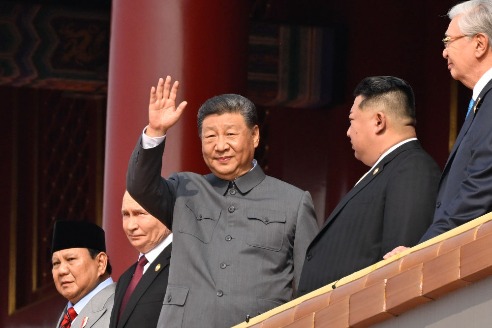Tencent sharply reduces JD stake
By HE WEI in Shanghai | CHINA DAILY | Updated: 2021-12-24 07:37

Tencent Holdings Ltd is distributing most of its shares in JD-a mega-tranche worth HK$127.69 billion ($16.37 billion)-to shareholders, representing a virtual retreat from the nation's leading e-commerce company.
Following the transfer as a onetime dividend, the gaming and social media giant will see its stake in JD fall to 2.3 percent from around 17 percent, effectively losing its title as JD's top shareholder.
In a statement to the Hong Kong bourse on Thursday, Tencent, which first invested in JD in 2014, said JD has reached such a stage that it can self-finance its own growth and that it is an appropriate time to transfer the majority of the shares to investors.
As part of the deal, Tencent President Martin Lau will also exit JD's board effective Thursday.
In a separate statement from JD, Chairman and CEO Liu Qiangdong thanked Lau's "extensive experience" that has been "highly valuable" to his company, and pledged to continue the "close and trusted strategic" partnership with Tencent.
Tencent, owner of WeChat, is adept at investing in companies in their initial phase to bolster development, and then withdrawing funds when self-sustenance has become viable.
JD has enjoyed exponential growth in part due to its access to Tencent's vast ecosystem, including the ubiquitous WeChat app which the Chinese rely on for paying bills, making purchases and other activities.
Apart from JD, Tencent also backs social commerce startup Pinduoduo and food delivery player Meituan, both of which have benefited from the paramount traffic generated by WeChat's over 1 billion userbase.
Industry observers see the withdrawal as a natural reaction to a string of antimonopoly investigations in the internet realm, implying the move could raise the curtain of future exits from startups.
"Tencent's plan may signal more disinvestments down the road from e-commerce players such as Kuaishou and Pinduoduo," said Matthew Kanterman and Tiffany Tam, analysts at Bloomberg Intelligence.
The pair pointed to China's antimonopoly efforts, which "aim to promote fairer competition between Tencent affiliates and Alibaba and others, and may give Tencent greater scope to accelerate overseas investments".
Zhuang Shuai, founder of Bailian Consulting and an expert in e-commerce and retail, sees the move inseparable from the credo of dismantling barriers among different internet players that Beijing has been advocating.
"Regulators are zooming in on monopolistic behavior and promoting connectivity across various internet platforms. It would thus be very hard for Tencent to stay impartial if it remains the dominant shareholder in a cohort of online firms," Zhuang said.
He said he anticipates future pullback by Tencent from Pinduoduo and 58.com, a local life services platform, to be "highly likely", and that rival companies might need to join in the fray.
There are also other business factors at play.
Zhuang said JD's synergy with the entire WeChat system has nearly peaked and it is losing out growth potential to rival Pinduoduo, which boasts the largest monthly active users in China's e-commerce territory and banks on strong social ties to make bulk deals at affordable prices.
He pointed to the gradual shift in Tencent's investment strategy, which is leaning toward retail brands such as fast food play Hefu Noodle and coffee chain Tim Hortons.
"Such tie-ins are a lot more complementary in nature, with investees providing goods and services and Tencent paving the way for internet infrastructure. Such a strategy perfectly circumvents the inherent conflicts between Tencent and other internet platforms," Zhuang said.
Fan Feifei in Beijing contributed to this story.
























